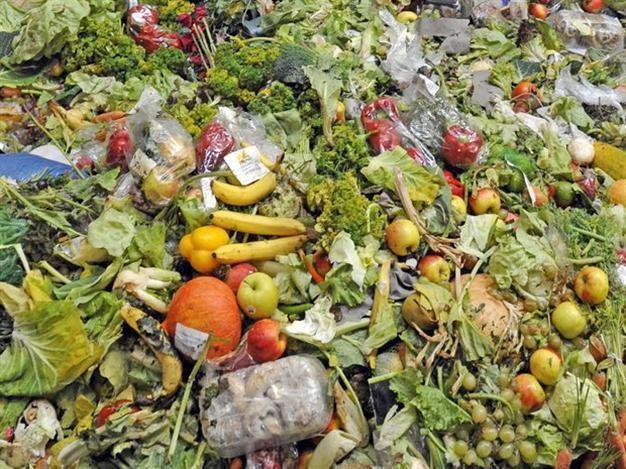Frugality for the future of food
Aylin Öney Tan - aylinoneytan@yahoo.com
 Food is essential to life. Our existence is dependent on the food we eat, so it is no coincidence that we often identify ourselves with what we eat. Food is in a way the very core of our cultures and identities. Mankind has always struggled for food, fought for food and prayed for food. We all surely appreciate what we eat and feel grateful to be able to have it. But what do we do for its future?
Food is essential to life. Our existence is dependent on the food we eat, so it is no coincidence that we often identify ourselves with what we eat. Food is in a way the very core of our cultures and identities. Mankind has always struggled for food, fought for food and prayed for food. We all surely appreciate what we eat and feel grateful to be able to have it. But what do we do for its future?Can we take for granted the food we have forever? What is the future of food?
We need to ask these questions at every possible level. Are we aware of the dangers that are ahead of the future of food? These questions were the core of the “Sustainable Food Conference,” held in Istanbul on Oct. 9 by the Sustainability Academy in Turkey. As Jo Confino, executive editor of Huffington Post, put it in his opening talk, we’re leading a high carbon lifestyle that is just not sustainable. We need to change that to save the planet. As simple as that! Food is one important item that each of us can take a step in our daily life to contribute to sustainability.
According to the Food and Agriculture Organization of the United Nations, almost one-third of all food produced in the world ends up being wasted. That equals to 1.3 billion tons of food. Most of the food wasted tends to be in developed countries. In developing countries, the main reasons of waste are due to poor infrastructure, such as shortages of transportation, storage or refrigeration facilities, whereas in higher income countries, it is mostly because of consumer behavior. We are too spoilt for consuming food we think is spoilt, sometimes just for aesthetic reasons. We’re not aware of the fact that rejecting a bruised apple or slightly limp looking spinach is actually a threatening act to the future of our food.
There is much to learn from our traditions and past. When we look at our traditional eateries, everyone knows that leftover buttery pilaf will end up either as soup, meatball fritters known as “kadınbudu köfte” or stuffed dolmas the next day. I’ve never seen a single cook that makes the ubiquitous Ezo Gelin soup by boiling its rice from scratch. All cooks that have learned the trade by apprenticing in local eateries know these tricks. Even in house kitchens, we have a strong tradition of taking care not to waste food. In one incident, my mother went to such an extent that she made tomato soup from cups of muhallebi (milk pudding) that has been standing on the fridge shelf for days. She wasn’t appreciated in the family then, but now I understand she had a point. Transforming leftover food miraculously to a totally new exciting dish is in every culture and instead of feeling shy about it, we should be proud of our creativity and frugality.
We need to redefine food ethics. The poor and the needy do not waste food. It is those who have and are educated that have a tendency to waste. When we were growing up, regardless of religion, wasting food was a sin. World War-struck Europe of the early 20th century knew how to make use of food without a single morsel being wasted. It is not easy to grasp that we all fell in the hands of greedy capitalism and how it happened so fast. One thing we have to think about is our consumer behavior. Wasted food in the production line is relatively small but waste in the field, in transportation and at the consumer end, especially in market chains, is enormous.
Luckily, using leftovers is becoming the new trend. It is no longer the dark secret of restaurants but something they can be proud of. Earlier this year, New York chef Dan Barber of Blue Hill launched a menu called WastED that consisted of dishes made entirely of discarded foods. Renowned Italian chef Massimo Bottura started a project in a soup kitchen in Milan to recycle food that was to be discarded at the Milan Expo Fair. Thanks to Rene Redzepi in Copenhagen, leftovers are elevated to high cuisine. These chefs have the guts to point out a fact we’re afraid to confess. We need to stop wasting. That simple!
Bite of the Week
Recipe of the Week: Just looking at our own eatery culture can teach us how to recycle our food. Here is an idea: The perfect reuse of leftover rice is a heartwarming lentil soup. The ubiquitous Ezo Gelin soup in Turkish restaurants is, in reality, a lentil soup from Gaziantep, renamed in Istanbul to distinguish it from the creamy strained Istanbul-style lentil soups. Though not admittedly, it is almost always made from rice pilaf from the day before. Boil 1½ cups red lentils in a pot with enough water to cover by 3-4 cm. When almost tender, add 1 cup of leftover cooked rice or pilaf together with 1 tablespoon tomato paste and ½ tablespoon red pepper paste, preferably both sun-reduced. Salt to taste and cook for 15-20 minutes. Stir in 5-6 cloves crushed garlic and juice of 1 lemon. Just before serving, heat 2 tablespoons butter in a small pan and when it starts to sizzle, add a generous tablespoon of dried mint and ½ tablespoon of crushed red pepper flakes. Remove from heat and drizzle over the soup. Enjoy your frugality for the future of food.












